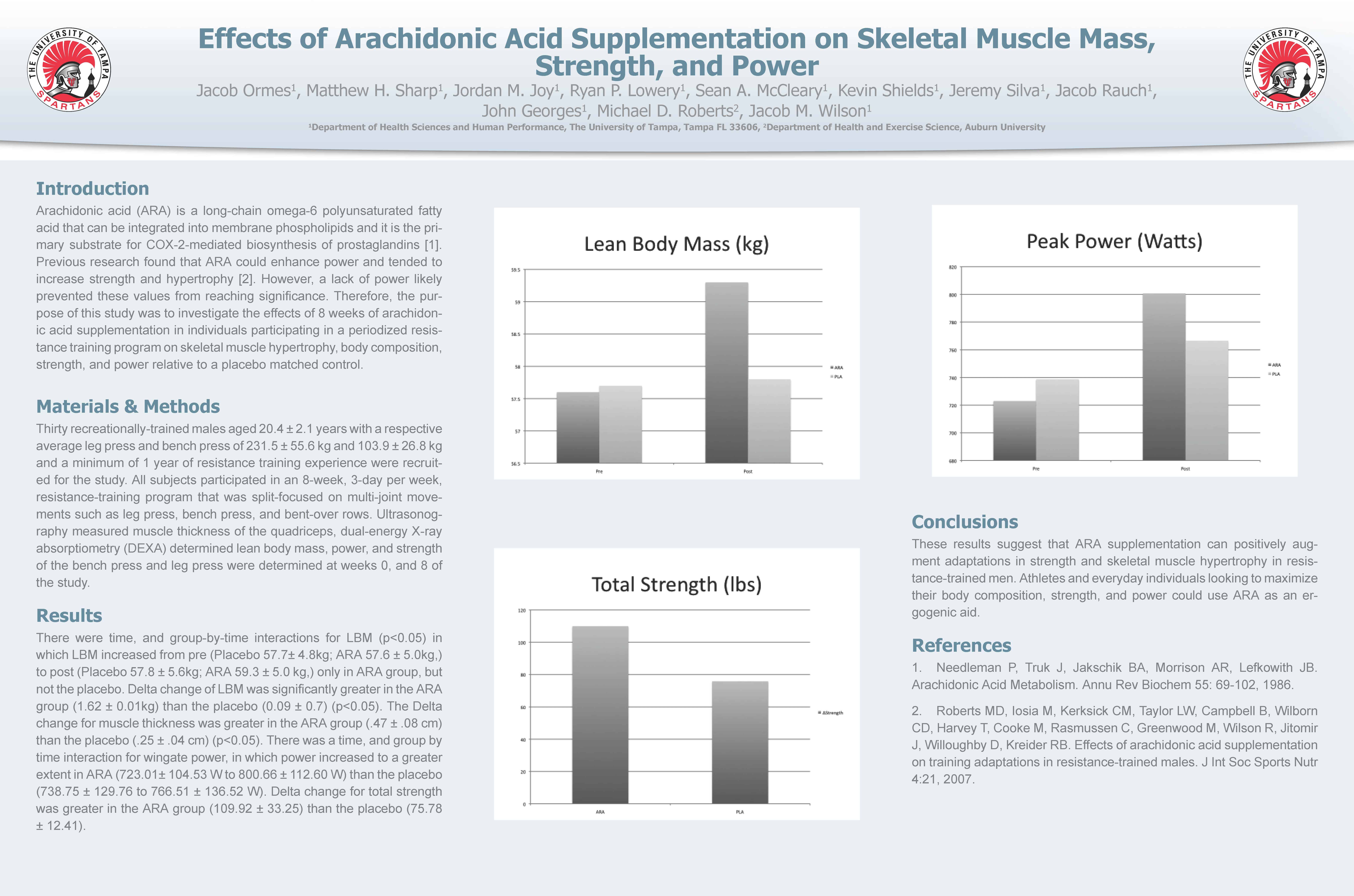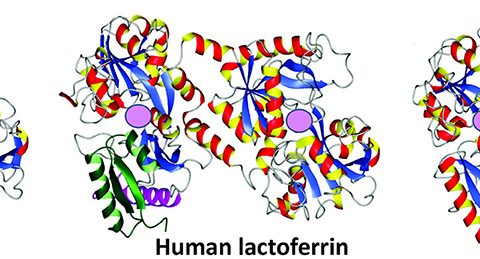NOTE: The brand of ARA used in the study covered in this article – the brand with longest track record and most extensive feedback by users – is X Factor by Molecular Nutrition. For companies looking to carry ARA, the manufacturer of ARA is Cargill and the contact (wholesale inquiries only) is sales@arachidonic.com
I recently did a video on ARA which discusses this study that found ARA had positive effects on strength and muscle mass, but was not able to give details because it had yet to be published as an abstract or full paper. The study results are now public and I cover them below. Two previous articles on ARA ( Part I), by Monica M cover why ARA is a generally misunderstood fatty acid and not a a negative to health, (part II ) covered the safety of ARA as a supplement. Finally, Part III, cuts through the hype and bro-science to give details on ARA and it’s use as a supplement for increasing strength and muscle mass! My understanding is a full paper is in process that will also examine the specific mechanisms of ARA and its impact on strength, muscle mass, and performance.
This study looked at the effects of 1.5g per day of ARA for 8 weeks on muscle hypertrophy, body composition, strength, and power, compared to a placebo matched control. For those who don’t enjoy reading abstracts and studies, here’s the cliffs notes followed by the full details:
• The group receiving 1.5g of ARA had in increase in lean body mass (LBM) of approx 3%, corresponding to 3.5 lb (1.6 kg) compared to no changes in the placebo group
• Muscle thickness increased in the group receiving ARA (+9.5%) vs. the placebo group (+4.7%).
• There was an improvement in anaerobic power (via Wingate test which measures 30 second maximal output), which increased in the group getting ARA (+10.7%) vs. the placebo group (+3.8%).
• The group receiving ARA increased their bench press and leg press strength to a greater degree than the placebo group.
Full Study Details:
Effects of Arachidonic Acid Supplementation on Skeletal Muscle Mass,
Strength, and Power
Jacob Ormes1, Matthew H. Sharp, Jordan M. et al.
Department of Health Sciences and Human Performance, The University of Tampa, Department of Health and Exercise Science, Auburn University
Introduction
Arachidonic acid (ARA) is a long-chain omega-6 polyunsaturated fatty
acid that can be integrated into membrane phospholipids and it is the primary
substrate for COX-2-mediated biosynthesis of prostaglandins [1].
Previous research found that ARA could enhance power and tended to
increase strength and hypertrophy [2]. However, a lack of power likely
prevented these values from reaching significance. Therefore, the purpose
of this study was to investigate the effects of 8 weeks of arachidonic
acid supplementation in individuals participating in a periodized resistance
training program on skeletal muscle hypertrophy, body composition,
strength, and power relative to a placebo matched control.
Materials & Methods
Thirty recreationally-trained males aged 20.4 ± 2.1 years with a respective
average leg press and bench press of 231.5 ± 55.6 kg and 103.9 ± 26.8 kg
and a minimum of 1 year of resistance training experience were recruited
for the study. All subjects participated in an 8-week, 3-day per week,
resistance-training program that was split-focused on multi-joint movements
such as leg press, bench press, and bent-over rows. Ultrasonography
measured muscle thickness of the quadriceps, dual-energy X-ray
absorptiometry (DEXA) determined lean body mass, power, and strength
of the bench press and leg press were determined at weeks 0, and 8 of
the study.
Results
There were time, and group-by-time interactions for LBM (p<0.05) in
which LBM increased from pre (Placebo 57.7± 4.8kg; ARA 57.6 ± 5.0kg,)
to post (Placebo 57.8 ± 5.6kg; ARA 59.3 ± 5.0 kg,) only in ARA group, but
not the placebo. Delta change of LBM was significantly greater in the ARA
group (1.62 ± 0.01kg) than the placebo (0.09 ± 0.7) (p<0.05). The Delta
change for muscle thickness was greater in the ARA group (.47 ± .08 cm)
than the placebo (.25 ± .04 cm) (p<0.05). There was a time, and group by
time interaction for wingate power, in which power increased to a greater
extent in ARA (723.01± 104.53 W to 800.66 ± 112.60 W) than the placebo
(738.75 ± 129.76 to 766.51 ± 136.52 W). Delta change for total strength
was greater in the ARA group (109.92 ± 33.25) than the placebo (75.78
± 12.41).
Conclusions
These results suggest that ARA supplementation can positively augment
adaptations in strength and skeletal muscle hypertrophy in resistance-
trained men. Athletes and everyday individuals looking to maximize
their body composition, strength, and power could use ARA as an ergogenic
aid.
Will Brink is the owner of the Brinkzone Blog. Will has over 30 years experience as a respected author, columnist and consultant, to the supplement, fitness, bodybuilding, and weight loss industry and has been extensively published. Will graduated from Harvard University with a concentration in the natural sciences, and is a consultant to major supplement, dairy, and pharmaceutical companies.
His often ground breaking articles can be found in publications such as Lets Live, Muscle Media 2000, MuscleMag International, The Life Extension Magazine, Muscle n Fitness, Inside Karate, Exercise For Men Only, Body International, Power, Oxygen, Penthouse, Women’s World and The Townsend Letter For Doctors.
He’s also been published in peer reviewed journals.
Will is the author of the popular e-books, both accompanied by private members forum access , Bodybuilding Revealed & Fat Loss Revealed.
You can also buy Will’s other books on Amazon, Apple iBook, and Barnes and Noble.





This looks to good to be true. If this is really the case, it’s the best performance enhancing supplement on the market bar none, better than creatine, beta alanine etc. Period.
It’s a long way from having the amount and depth of research as creatine, but ARA appears a very promising supplement yes. I have been keeping and eye on this one for years, and reviewed it in my BBR program and Supplement Bible book. At times of review, this study didn’t exist, but I noted ARA had unusually good feedback and gave it a “Might be worth a try” rating. My health concerns for ARA have also been largely addressed via the info in the articles linked above.
Great article. I read somewhere that ARA causes excessive inflammation to the bodfy, any truth to that. Also, do we need to supplyment or is there enough ARA in certain foods?
The articles linked above covers that in great depth. If one is getting excessive ARA and no Omega 3, then it’s very possible that inflammation is the result. But ARA appears to have health benefits of its own, and is needed to balance out Omega 3 intakes. Per usual – especially with fatty acids – it’s a balancing act. Read articles and watch vid for full details.
On thing that’s clear, the old view/model that ARA = bad, is totally wrong. 🙂
Does ARA affect blood pressure?
I’d take a look at the articles linked that go onto depth on the safety profile of ARA. As far as I know, no negative effects on BP in healthy people.
I am from Jamaica and one plant indigenous to that island is Ackee. This is used to create a very tastee dish when cooked with dried, salted fish. However, some years ago some scientists made the observation that the high incidents of prostate cancer in Jamaica and other West Indian islands was to due to the effects of arachidonic acid found in our Ackee. The statement by these scientist is that arachidonic acid directly leads to prostate cancer.
It would be interesting if you could apply your research skills to these conclusions and square it with the bodybuilding effects you described in your article. I look forward to your findings.
Mike, did you take a look at the articles linked above? They go into great depth on ARA and possible links (vs any real cause and effect) to various diseases such as cancer. Do you not recall a few years ago a few studies that associated both fish oil and flax oil with prostate cancer also? They are covered on this site if you search. Much of what you will read on ARA is based on outdated science and knowledge of ARA. The paradigm on ARA will slowly change.
3.5 pounds of LBM in 8 weeks extrapolated out to a full 52 weeks equates to a rate of 22.75 pounds of muscle gain per year. This seems very suspect, however, I don’t think anyone was claiming that muscle gain over a given year is linear.
I’d still like to see further, longer-term studies done on this supplement to see how it pans out over time.
I forgot which guru made the point about “putting supplements up to the test of time”, but I think its a great point.
There’s no expectations of a linear response and no drug, not even the most potent drugs, much less a supplement, will deliver linear responses on LBM, strength, etc. Drugs or supplements must stand the test of time over repeated studies to be sure. That’s why I’d have ARA in the “worth a try” category vs. A+ rating of say creatine or whey.
Riding off the last comment, do you feel that gains are “permanent” as long as training continues after supplementation stops, or are they contingent on the continual cycling of the supplement?
Good question John, for which I don’t have a great answer. That has not been looked at in studies, so that part is anecdotal evidence at this time. On the surface, there’s no reason to believe gains made while using this supplement (and remember, ARA is already in your diet in lower amounts) will be lost once you stop, and that seems to be the general feedback from uses so far.
Hi Will,
Can ARA be taken long term without cycling it on and off ? Just like creatine, whey protein etc…
No studies have examined cycle vs chronic intake. Most seem to cycle it.
So far the only research data I’ve seen has been performed on younger trained athletes. Turning 60 soon and still train as hard as most guys half my age. The hardest thing at my age is recovery time and straying too long from a good diet. My body isn’t as forgiving as it used to be. What can us older trainers expect?
Impossible to say as you point out, has not been studied in more mature lifters, depends to some degree on your fatty acid status, and other variables. Any attempt at a definitive answer would be a WAG on my end. Have not gotten an “real world” feedback from mature lifters, so at the moment, we can only assume (not generally a plus in science…) if it works as this study suggests, it will be effective in lifters of varying ages.